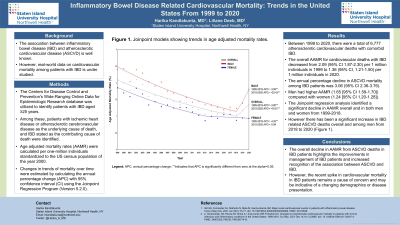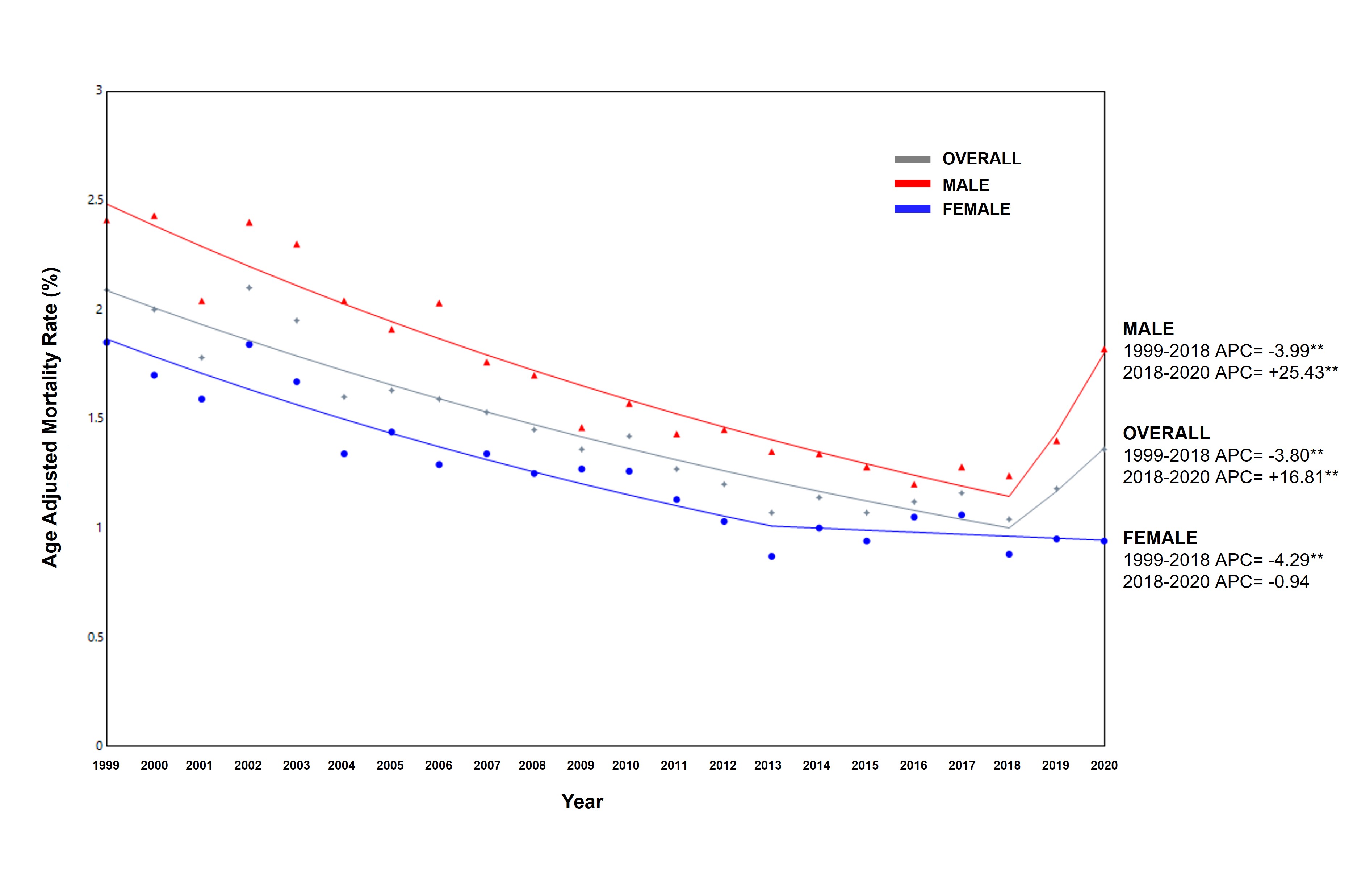Sunday Poster Session
Category: IBD
P0833 - Inflammatory Bowel Disease-Related Cardiovascular Mortality: Trends in the United States From 1999 to 2020
Sunday, October 27, 2024
3:30 PM - 7:00 PM ET
Location: Exhibit Hall E

Has Audio
- HK
Harika Kandlakunta, MD
Staten Island University Hospital, Northwell Health
Staten Island, NY
Presenting Author(s)
Harika Kandlakunta, MD, Liliane Deeb, MD
Staten Island University Hospital, Northwell Health, Staten Island, NY
Introduction: The association between inflammatory bowel disease (IBD) and atherosclerotic cardiovascular disease (ASCVD) secondary to chronic systemic inflammation and endothelial dysfunction is well established. However, real-world data on cardiovascular mortality among patients with IBD is still under studied.
Methods: The Centers for Disease Control and Prevention's Wide‐Ranging Online Data for Epidemiologic Research database was utilized to identify patients with IBD aged ≥25 years. Among these, patients with ischemic heart disease or atherosclerotic cerebrovascular disease as the underlying cause of death, and IBD stated as the contributing cause of death were identified. Age adjusted mortality rates (AAMR) were calculated per one-million individuals standardized to the US census population of the year 2000. Changes in trends of mortality over time were estimated by calculating the annual percentage change (APC) with 95% confidence interval (CI) using the Joinpoint Regression Program (Version 5.2.0).
Results: Between 1999 to 2020, there were a total of 6,777 atherosclerotic cardiovascular deaths with comorbid IBD. The overall AAMR for cardiovascular deaths with IBD decreased from 2.09 (95% CI 1.87-2.30) per 1 million individuals in 1999 to 1.36 (95% CI, 1.21-1.50) per 1 million individuals in 2020. The annual percentage decline in ASCVD mortality among IBD patients was 3.06 (95% CI 2.36-3.76). Overall, men had higher AAMR (1.65 [95% CI 1.59-1.70]) compared with women (1.24 [95% CI 1.20-1.28]). The Joinpoint regression analysis identified a significant decline in AAMR overall and in both men and women from 1999-2018. However there has been a significant increase in IBD related ASCVD deaths overall and among men from 2018 to 2020 (Figure 1).
Discussion: The overall decline in AAMR from ASCVD deaths in IBD patients highlights the improvements in management of IBD patients with treat to target strategy through disease-modifying medications, as well as increased recognition and prevention of ASCVD associated with IBD. However, the recent spike in cardiovascular mortality in IBD patients remains a cause of concern and may be indicative of a changing demographics or disease presentation. Further research is warranted for a better understanding of the natural history of ASCVD in the IBD population.

Disclosures:
Harika Kandlakunta, MD, Liliane Deeb, MD. P0833 - Inflammatory Bowel Disease-Related Cardiovascular Mortality: Trends in the United States From 1999 to 2020, ACG 2024 Annual Scientific Meeting Abstracts. Philadelphia, PA: American College of Gastroenterology.
Staten Island University Hospital, Northwell Health, Staten Island, NY
Introduction: The association between inflammatory bowel disease (IBD) and atherosclerotic cardiovascular disease (ASCVD) secondary to chronic systemic inflammation and endothelial dysfunction is well established. However, real-world data on cardiovascular mortality among patients with IBD is still under studied.
Methods: The Centers for Disease Control and Prevention's Wide‐Ranging Online Data for Epidemiologic Research database was utilized to identify patients with IBD aged ≥25 years. Among these, patients with ischemic heart disease or atherosclerotic cerebrovascular disease as the underlying cause of death, and IBD stated as the contributing cause of death were identified. Age adjusted mortality rates (AAMR) were calculated per one-million individuals standardized to the US census population of the year 2000. Changes in trends of mortality over time were estimated by calculating the annual percentage change (APC) with 95% confidence interval (CI) using the Joinpoint Regression Program (Version 5.2.0).
Results: Between 1999 to 2020, there were a total of 6,777 atherosclerotic cardiovascular deaths with comorbid IBD. The overall AAMR for cardiovascular deaths with IBD decreased from 2.09 (95% CI 1.87-2.30) per 1 million individuals in 1999 to 1.36 (95% CI, 1.21-1.50) per 1 million individuals in 2020. The annual percentage decline in ASCVD mortality among IBD patients was 3.06 (95% CI 2.36-3.76). Overall, men had higher AAMR (1.65 [95% CI 1.59-1.70]) compared with women (1.24 [95% CI 1.20-1.28]). The Joinpoint regression analysis identified a significant decline in AAMR overall and in both men and women from 1999-2018. However there has been a significant increase in IBD related ASCVD deaths overall and among men from 2018 to 2020 (Figure 1).
Discussion: The overall decline in AAMR from ASCVD deaths in IBD patients highlights the improvements in management of IBD patients with treat to target strategy through disease-modifying medications, as well as increased recognition and prevention of ASCVD associated with IBD. However, the recent spike in cardiovascular mortality in IBD patients remains a cause of concern and may be indicative of a changing demographics or disease presentation. Further research is warranted for a better understanding of the natural history of ASCVD in the IBD population.

Figure: Figure 1. Joinpoint models showing trends in age adjusted mortality rates.
Legend: APC: annual percentage change; **indicates that APC is significantly different from zero at the alpha=0.05.
Legend: APC: annual percentage change; **indicates that APC is significantly different from zero at the alpha=0.05.
Disclosures:
Harika Kandlakunta indicated no relevant financial relationships.
Liliane Deeb indicated no relevant financial relationships.
Harika Kandlakunta, MD, Liliane Deeb, MD. P0833 - Inflammatory Bowel Disease-Related Cardiovascular Mortality: Trends in the United States From 1999 to 2020, ACG 2024 Annual Scientific Meeting Abstracts. Philadelphia, PA: American College of Gastroenterology.
